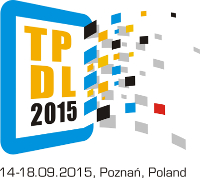Third International Workshop on
Digital Scientific Communication (WDSC):
Reuse, Sharing, and Assessment
of All Research Products
Friday, 18th of September 2015

Workshop objectives
The Workshop in Digital Scientific Communication (WDSC) aims at addressing all issues arising in the attempt of revising current scientific communication practices and surrounding or related ICT or RI technologies in order to deliver to scientists a complete picture of existing research results. The main motivations and challenges are the identification of solutions for partly or fully sharing scope and/or results of the scientific process in order to maximize reusability, accessibility, and assessment of research activities. WDSC takes over the LCPD workshop series (held in Malta 2013 and London 2014, in conjunction with TPDL conferences) from a broader perspective and as such it becomes its natural continuation.
Background
In the last decade, information and communication technology (ICT) advances have deeply changed the way research is conducted within research infrastructures (RIs). A Research Infrastructure is intended as the compound of elements regarding the organization (roles, procedures, etc.), the structure (buildings, laboratories, etc.), the resources (microscopes, telescopes, sensors, services, data, digital library resources), and the technology (hard- and software, network protocols, Internet, applications, etc.) underpinning the implementation of scientific research. In this respect research relies mainly on high-quality and digitally accessible research products (e.g. publications, datasets, experiments, software, web sites, blogs) in order to generate novel ideas, findings, and concrete results.
Along the same line scientific communication has mutated in order to adapt its underlying mission (and business models) to such new scenarios. In particular, the traditional paradigm of research publishing by sole articles cannot cope with the increasing demands of immediate access and effective reuse of any research results. Scientists, funders, and research institutions are pushing for innovative scientific communication workflows (i.e. submission, peer-review, access, re-use, citation, and scientific reward), marrying an holistic approach where “publishing” includes in principle any digital product resulting from a research activity that is relevant to the interpretation, evaluation, and reuse of the activity or part of it. Defining, taking up, and supporting such “revolutionary” publishing workflows become urgent challenges, to be addressed by ICT solutions capable of fostering and driving radical changes in the way science is developed.
23.04.2015
Workshop WebSite Online 